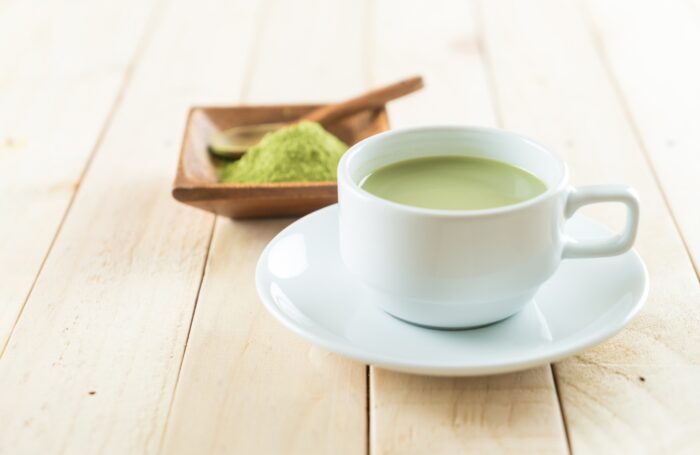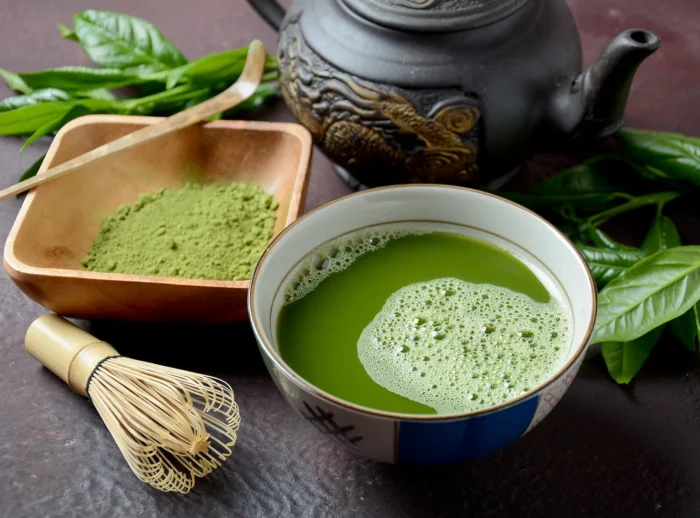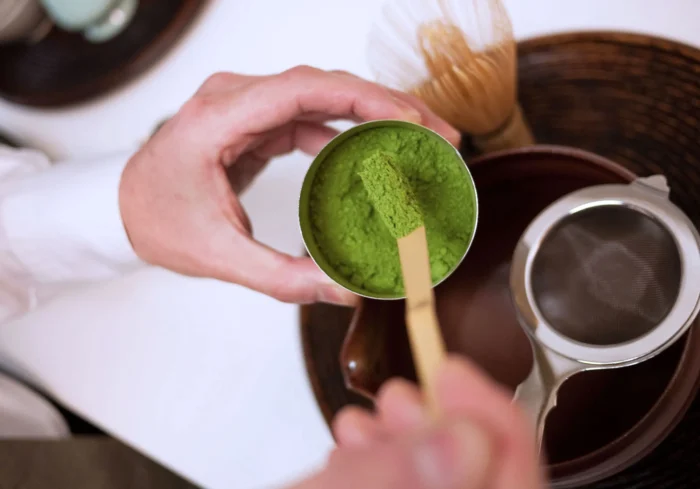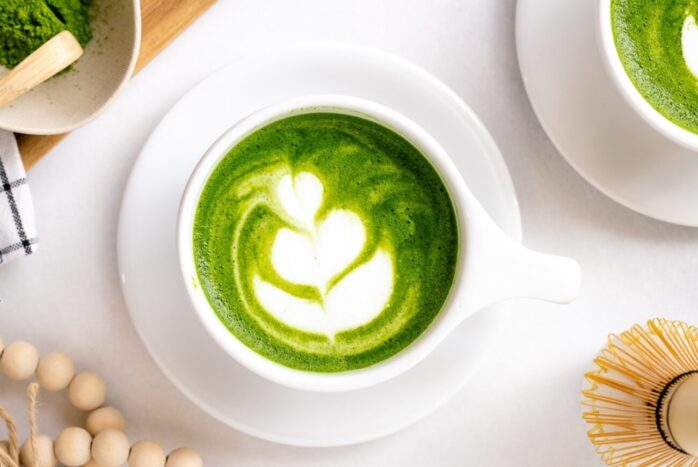In the world of health and wellness, organic matcha tea has gained immense popularity. A Japanese tradition transcending cultural boundaries, matcha has become a global phenomenon. More than just a beverage, organic matcha tea is celebrated for its unique production process, vibrant green color, and an array of health benefits. In this exploration, we will delve into the origins, production, ceremonial significance, and myriad health advantages of this exquisite green elixir.
Origins of Matcha:
During the Tang Dynasty (618-907 AD), tea leaves were ground into a fine powder for the first time. This method of preparing tea was later brought to Japan by Buddhist monks, marking the beginning of matcha’s journey in Japanese culture. Over the centuries, matcha evolved from being a strictly ceremonial drink to a popular everyday beverage.

Production Process:
What sets matcha apart from other teas is its intricate production process. The tea plants, Camellia sinensis, used for organic matcha tea, are shade-grown for about 20-30 days before harvest. By shading matcha, amino acids, particularly L-theanine, are produced in more significant quantities, and matcha has a vibrant green color.
A fine powder is formed by stone-grinding the leaves after they have been steamed to halt fermentation. Using this meticulous process, matcha captures the essence of the entire tea leaf, providing a concentrated source of nutrients.
Ceremonial Significance:
In Japanese culture, matcha is deeply incorporated into traditional tea ceremonies such as “chanoyu” and “chado.” During this ceremony, harmony, respect, purity, and tranquility are emphasized. The preparation and consumption of matcha are carefully choreographed, creating a meditative experience for both the host and the guests.
During the ceremony, matcha powder is whisked with hot water using a bamboo whisk to create a frothy, velvety liquid. The tea is then served in special bowls, and each step is performed with precision and mindfulness. This ritual not only celebrates the art of tea-making but also reflects the values of balance and connection with nature.

Health Benefits of Organic Matcha Tea:
1. Rich in Antioxidants:
In addition to being a powerhouse of antioxidants, matcha is also known for its cancer-fighting properties, especially catechins. Antioxidants prevent cell damage and support overall health by neutralizing free radicals.
2. Boosts Metabolism and Burns Calories:
Catechins in matcha, especially epigallocatechin gallate (EGCG), have been linked to increased metabolism and fat loss. Consuming matcha regularly may help with weight management and promote a healthy lifestyle.
3. Enhances Mental Focus and Calmness:
L-theanine, which is found in matcha, promotes relaxation and alertness. With matcha’s combination of L-theanine and caffeine, a state of focused calmness is achieved without the jittery side effects often associated with other caffeinated drinks.
4. Detoxifies the Body:
The shade-growing process of matcha increases the chlorophyll content, which is known for its detoxifying properties. A natural and effective detoxification process is supported by chlorophyll, which helps eliminate heavy metals and toxins from the body.
5. Rich in Nutrients:
The powdered form of matcha allows you to ingest the entire tea leaf, so you consume more nutrients. Among these nutrients are vitamins A and C, potassium, iron, and fiber, all of which contribute to a healthy body.
6. Supports Cardiovascular Health:
In addition to lowering blood pressure and LDL cholesterol, green tea, including matcha, promotes cardiovascular health.
7. Balances Blood Sugar Levels:
Matcha has been shown to lower blood sugar levels, potentially reducing the risk of type 2 diabetes. The combination of antioxidants and the slow release of caffeine in matcha may contribute to improved insulin sensitivity.

What is Organic Matcha Green Tea Good For?
Organic matcha green tea has gained popularity in recent years for its unique flavor and numerous health benefits. Unlike traditional green tea, matcha is made from shade-grown tea leaves that are stone-ground into a fine powder. The vibrant green powder is then whisked into hot water, creating a frothy and rich beverage. Here are some of the key benefits of consuming organic matcha green tea:
Rich in Antioxidants: Matcha is renowned for its high concentration of antioxidants, particularly catechins, which help combat oxidative stress and reduce the risk of chronic diseases. The most potent catechin in matcha is epigallocatechin gallate (EGCG), known for its powerful cancer-fighting properties.
Boosts Metabolism and Burns Calories: The combination of caffeine and catechins in matcha has been shown to enhance metabolism, aiding in weight loss. Unlike coffee, matcha provides a sustained energy boost without the jitters or crashes.
Calming Effect: Matcha contains an amino acid called L-theanine, which promotes relaxation and reduces stress. This unique combination of L-theanine and caffeine creates a state of focused calmness, making matcha an ideal beverage for meditation or concentration.
Detoxifies the Body: The shade-grown cultivation of matcha increases chlorophyll levels, contributing to its vibrant green color. Chlorophyll helps to cleanse and detoxify the body by eliminating heavy metals and toxins.
Supports Cardiovascular Health: Regular consumption of matcha has been linked to improved heart health by lowering bad cholesterol levels and reducing the risk of heart disease.
Enhances Cognitive Function: The combination of caffeine and L-theanine in matcha promotes improved cognitive function, including enhanced memory, concentration, and attention.
Regulates Blood Sugar Levels: Matcha may help stabilize blood sugar levels, making it a beneficial choice for individuals with diabetes or those at risk of developing the condition.
Strengthens the Immune System: The antioxidants in matcha, particularly EGCG, have immune-boosting properties that help the body defend against infections and illnesses.
Incorporating organic matcha green tea into your daily routine can be a flavorful and healthful addition, providing a myriad of benefits for both body and mind.

Conclusion:
An organic Matcha Tea combines tradition and modern wellness harmoniously. Matcha continues to captivate tea enthusiasts and health-conscious individuals alike due to its ceremonial roots in Japan and its global recognition as a superfood. The health benefits of matcha make it an indispensable part of a balanced and mindful lifestyle, thanks to its delicious taste and vibrant color. Whether enjoyed in a traditional tea ceremony or as a daily ritual, organic matcha tea invites us to savor the present moment while nurturing our body and soul. Start your journey to a healthier, more harmonious life with matcha.





























































